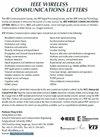Dual-Segment Clustering Strategy for Hierarchical Federated Learning in Heterogeneous Wireless Environments
IF 5.5
3区 计算机科学
Q1 COMPUTER SCIENCE, INFORMATION SYSTEMS
引用次数: 0
Abstract
Non-independent and identically distributed (Non-IID) data adversely affects federated learning (FL) while heterogeneity in communication quality can undermine the reliability of model parameter transmission, potentially degrading wireless FL convergence. This letter proposes a novel dual-segment clustering (DSC) strategy that jointly addresses communication and data heterogeneity in FL. This is achieved by defining a new signal-to-noise ratio (SNR) matrix and information quantity matrix to capture the communication and data heterogeneity, respectively. The celebrated affinity propagation algorithm is leveraged to iteratively refine the clustering of clients based on the newly defined matrices effectively enhancing model aggregation in heterogeneous environments. The convergence analysis and experimental results show that the DSC strategy can improve the convergence rate of wireless FL and demonstrate superior accuracy in heterogeneous environments compared to classical clustering methods.异构环境下分层联邦学习的双段聚类策略
非独立和同分布(Non-IID)数据会对联邦学习(FL)产生不利影响,而通信质量的异质性会破坏模型参数传输的可靠性,可能会降低无线FL的收敛速度。本文提出了一种新的双段聚类(DSC)策略,该策略共同解决了FL中的通信和数据异质性。这是通过定义新的信噪比(SNR)矩阵和信息量矩阵来实现的,分别捕获通信和数据异质性。利用著名的亲和传播算法,基于新定义的矩阵迭代地改进客户端聚类,有效地增强了异构环境中的模型聚合。收敛性分析和实验结果表明,与传统聚类方法相比,DSC策略可以提高无线FL的收敛速度,并在异构环境下显示出更高的精度。
本文章由计算机程序翻译,如有差异,请以英文原文为准。
求助全文
约1分钟内获得全文
求助全文
来源期刊

IEEE Wireless Communications Letters
Engineering-Electrical and Electronic Engineering
CiteScore
12.30
自引率
6.30%
发文量
481
期刊介绍:
IEEE Wireless Communications Letters publishes short papers in a rapid publication cycle on advances in the state-of-the-art of wireless communications. Both theoretical contributions (including new techniques, concepts, and analyses) and practical contributions (including system experiments and prototypes, and new applications) are encouraged. This journal focuses on the physical layer and the link layer of wireless communication systems.
 求助内容:
求助内容: 应助结果提醒方式:
应助结果提醒方式:


